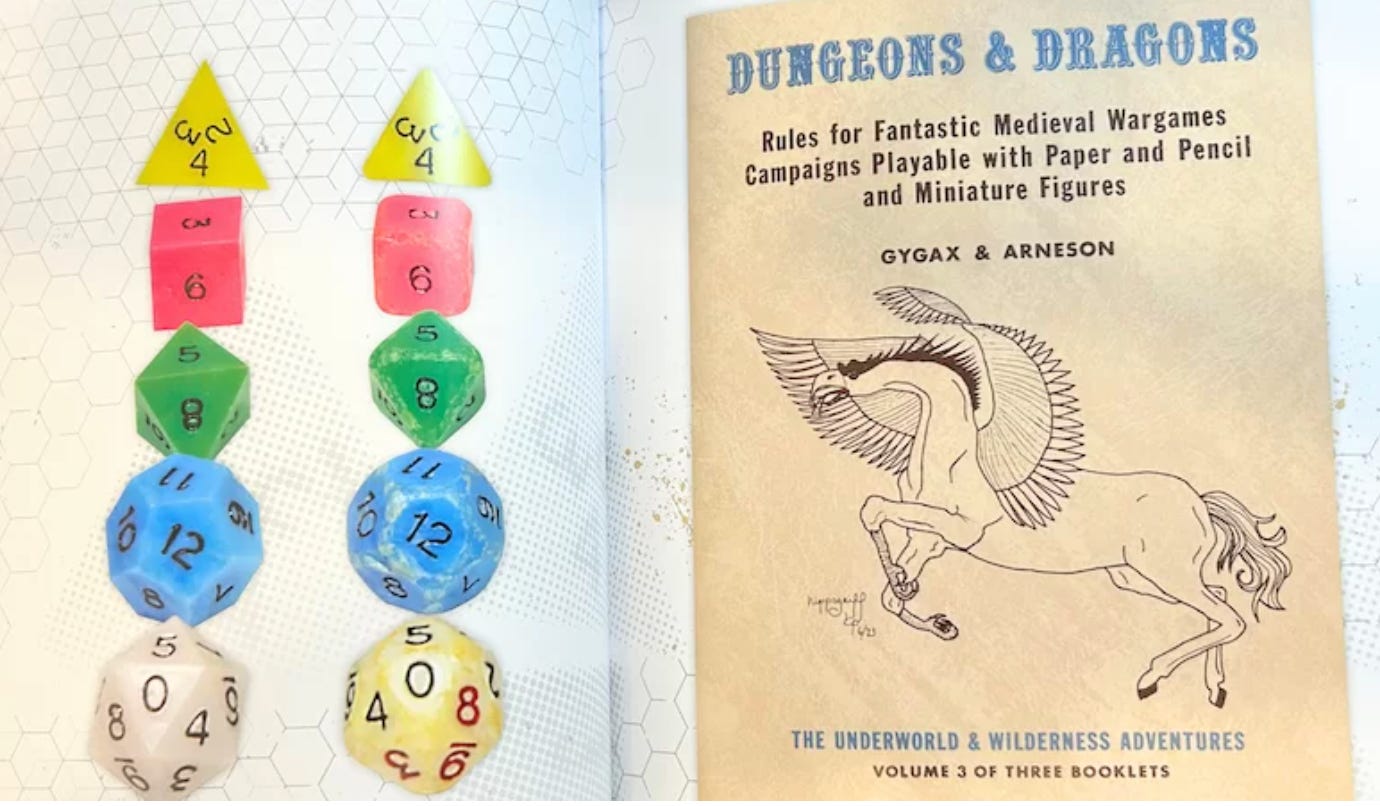I’ve seen quite a bit of ink spilled over the years about random encounters - but it wasn’t until recently that I’ve seen that ink (online, so…bytes?) spilled to knock ‘em.
I realize that this hobby has all kinds of folks and play-styles, and I think that this is a terrific thing. I will, however, take this opportunity to speak out in defense of the humble random encounter, or, simply, to briefly explain why I like them so much…
And maybe - why you should, too.
Perhaps the number one thing about random encounters, and, really, random tables of any kind, is they allow the DM to be surprised, and, from there, be forced to engage, to innovate, to think on their feet. To engage in the act of creation in the moment, rather than breaking out a stale package of dry notes and force-feeding them to the player group.
I believe there is a type of DM who does *not* like this feeling at all (no, not one bit!), and would prefer things be kept on the tracks of “prepped material.” For me, this misses one of the finest aspects of the fynne olde arte of ye DMing:
Being surprised means you get to play too.
As someone who, for better or worse, is always the DM, using tables is one of the ways I get to enjoy myself while playing, because I’m not just “learning the lines” as it were. I’m getting to have fun and interacting with the world.
Like most things you can improve at, this style of DMing really is an acquired skill, and becomes more and more fun with time as you get better at it. You’ll jot down table notes connecting one random encounter to another, or make a note for next time - where did those brigands come from? Who did those soldiers work for? What attracted that wyvern to the area, or is its lair nearby?
Other times, connections and magical synchronicities will emerge from the dice rolls so obviously it will truly feel almost supernatural - these moments of synergy and connectivity are really priceless and not easily obtained with a railroad style of play.
Regardless of how people feel about “prep” (another dirty word these days for many), I’ve always been a firm believer in prepping the broad strokes of the world, and then setting the PCs totally loose in it.
Encounter tables are how the feel and tension of various areas are sketched in - will it be the common encounter of soldiers on patrol, or will an uncommon dice roll occur and trigger something more wonderful or terrible?
One argument I’ve seen against them is that their randomness “isn’t coherent” or “just slows things down.”
Here’s a little not-so-secret: really good encounter tables aren’t usually totally random. They’re often curated by the overland area or level of dungeon/theme of dungeon and produce interesting elements that play off one another, and open up possible routes of emergent narrative that players can interact with and involve themselves in.
Because of their randomly occurring nature, multiple runs through the same place might produce totally different results, and keep things interesting, fresh and fun.
As an example, a simple walk to the bookstore might net me a variety of random encounters: some of these are more likely than others, but are often dependent on time of day, the route I choose, and so on - these can be mechanically created through how tables are loaded, what dice are used, and whether there are variants to the tables for night and day.
An added benefit of this is that increases the weight of player choice: will they go the longer, safer route, or choose the dangerous path in order to save time or beat dwindling resources?
This can add a really fun element to your game that makes players frown over the map, weighing the pros and cons before a journey from settlement to dungeon or back again.
Finally, perhaps one of the best arguments for the random encounter is that your players can see they are random. Maybe yours don’t care, but if mine know that every single encounter that will occur during game time is pre-planned, there’s a certain “inevitability” and loss of agency that comes from that.
Random encounters maintain a sense of tension, of the unknown, of the dangerous and uncertain.
For player and DM alike, the random encounter is lurking death or wondrous allies…and much of the joy in this wonderful game is in the not knowing!
As always, your mileage may vary, but if you don’t use them currently, maybe just give them a shot. See if your table likes them - mine always gets a huge kick out of them, and couldn’t imagine a game without the ever-present tension of the dungeon wandering monster encounter or the trepidation produced by overland journeys.
Either way, have fun, and keep your blades sharp!
-CG








This is a great topic. I think encounter tables being out of vogue is the fault of 5E. In 5E an unexpected "encounter" is 100% always combat and soaks hours of gameplay. I didn't start using them until playing OSR style games that include reaction tables. I now love random encounter tables.
My comment doesn't focus whether or not random tables are better than 'scheduled' events. I agree with the overall concept as I really love the concept of uncertainty in RPGs. I do reccomend a reading which is a milestone for such a concept: 'Uncertainty in games' by Greg Costikyan. ...and back to my comfort zone: I have realized other ways to keep high the level of uncertainty in my game that random tables are even not necessary and I came to this solution also thanks to the reading here above!